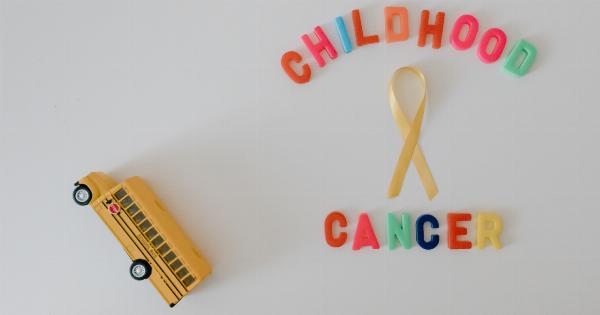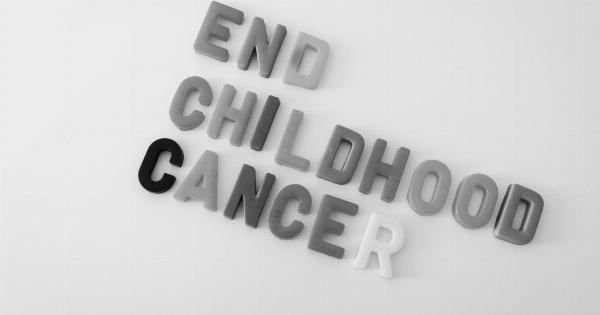Pediatric cancer refers to cancer that affects children and adolescents under the age of 18. It is a devastating diagnosis that affects not only the child but their entire family.
The battle against pediatric cancer has been ongoing for decades, with researchers, doctors, and organizations working tirelessly to find better treatments, improve survival rates, and ultimately find a cure. This article explores the current state of the fight against pediatric cancer, the challenges faced, and the progress being made.
Understanding Pediatric Cancer
Pediatric cancer encompasses a wide range of different types of cancer that can affect children. The most common types include leukemia, brain tumors, neuroblastoma, Wilms tumor, lymphoma, and sarcomas.
Unlike cancer in adults, pediatric cancer is often more aggressive and can metastasize quickly. It requires specialized treatment and care to ensure the best outcomes for the young patients.
The Impact on Children and Families
A diagnosis of pediatric cancer is a life-altering event for both the child and their family. It affects not only the physical health of the child but also their emotional well-being, social development, and overall quality of life.
Families also face significant emotional and financial burdens, as they navigate complex treatment plans, lengthy hospital stays, and ongoing medical expenses. The fight against pediatric cancer extends beyond the medical realm, aiming to support families and provide holistic care.
The Role of Research
Research is at the forefront of the fight against pediatric cancer. Scientists and medical professionals dedicate their careers to understanding the biology of pediatric cancer, identifying risk factors, and developing innovative treatment approaches.
Through clinical trials and collaborative efforts, researchers aim to improve outcomes and minimize the long-term effects of cancer treatments on children’s health.
Advancements in Treatment
Over the years, significant advancements have been made in the treatment of pediatric cancer.
Chemotherapy, radiation therapy, and surgical interventions have become more targeted and effective, resulting in improved survival rates for many childhood cancers. Additionally, immunotherapy and targeted therapies have emerged as promising treatment options for specific types of pediatric cancer, offering hope for improved outcomes and reduced side effects.
Challenges in Pediatric Cancer Research
Despite the progress made, several challenges persist in the fight against pediatric cancer. One major challenge is the rarity of pediatric cancer compared to adult cancers.
This makes it difficult to conduct large-scale clinical trials and develop treatments specifically tailored to children. Additionally, funding for pediatric cancer research is limited compared to other types of cancer, further hindering progress in the field.
Raising Awareness and Advocacy
Raising awareness about pediatric cancer is crucial in garnering public support and funding for research. Various organizations, such as St.
Jude Children’s Research Hospital and the American Childhood Cancer Organization, work tirelessly to educate the public, advocate for policy changes, and provide support to families affected by pediatric cancer. Their efforts help amplify the voices of children with cancer and their families, driving the fight against pediatric cancer forward.
Supporting Pediatric Cancer Patients and Families
Providing comprehensive support to pediatric cancer patients and their families is essential. Beyond medical treatments, holistic care includes psychosocial support, educational support, and financial assistance.
Organizations and hospitals specializing in pediatric oncology offer a range of services, such as counseling, support groups, assistance with school reintegration, and financial aid programs, to alleviate the burden faced by families.
Promising Research and Innovations
Despite the challenges, ongoing research continues to bring hope in the fight against pediatric cancer. The development of personalized medicine based on genomic profiling shows promise in identifying targeted therapies for individual patients.
Furthermore, the emerging field of precision oncology aims to tailor treatment approaches to each child’s unique cancer biology, ultimately increasing treatment effectiveness and reducing potential side effects.
The Importance of Survivorship Care
The fight against pediatric cancer extends beyond treatment and cure.
Survivorship care is a critical aspect of pediatric oncology, ensuring that survivors receive appropriate long-term monitoring, management of potential late effects, and support for a smooth transition into adulthood. Survivorship clinics and specialized healthcare providers play a fundamental role in addressing the specific needs of pediatric cancer survivors.
Collaboration and Global Efforts
Collaboration and global efforts are vital in advancing the fight against pediatric cancer. International cooperation allows for the sharing of knowledge, resources, and expertise to accelerate progress.
Organizations, research institutions, and medical professionals from around the world work in collaboration to develop novel treatment approaches and improve outcomes for children with cancer.
The Way Forward: A Cure for Pediatric Cancer
While significant advancements have been made, the ultimate goal remains a cure for pediatric cancer. Increased funding, continued research, and public support are crucial in driving the fight forward.
It is essential to advocate for policies that prioritize pediatric cancer research and ensure access to quality care for all children. With ongoing efforts, the fight against pediatric cancer will continue to make strides towards a future where no child has to endure this devastating disease.
























